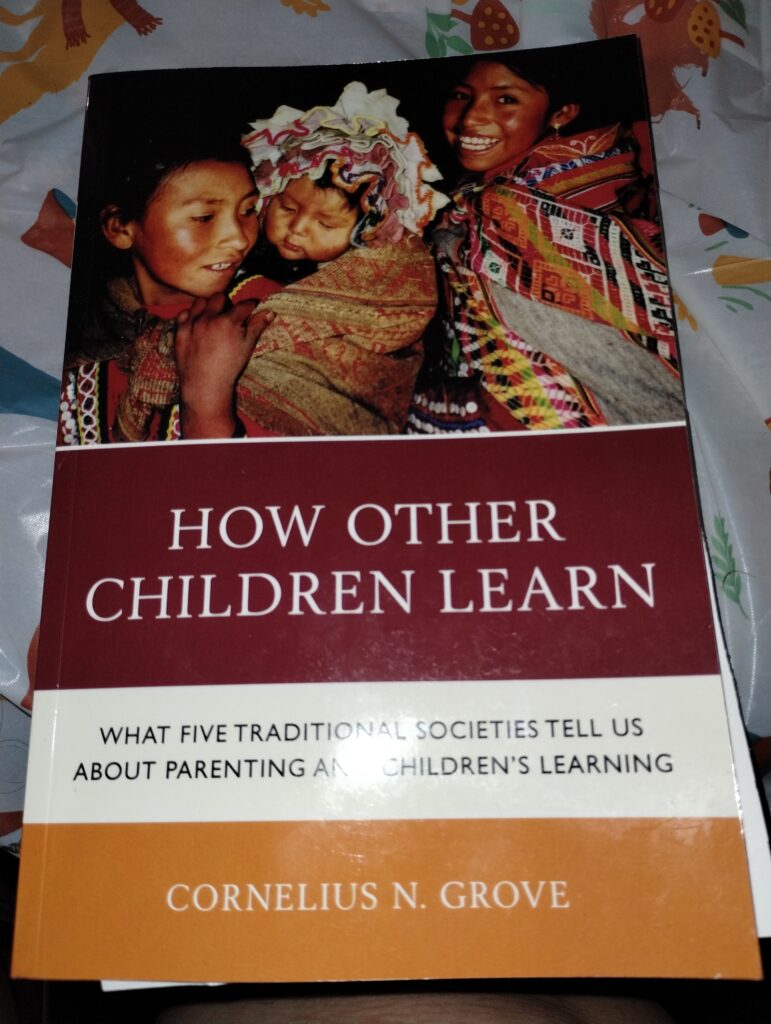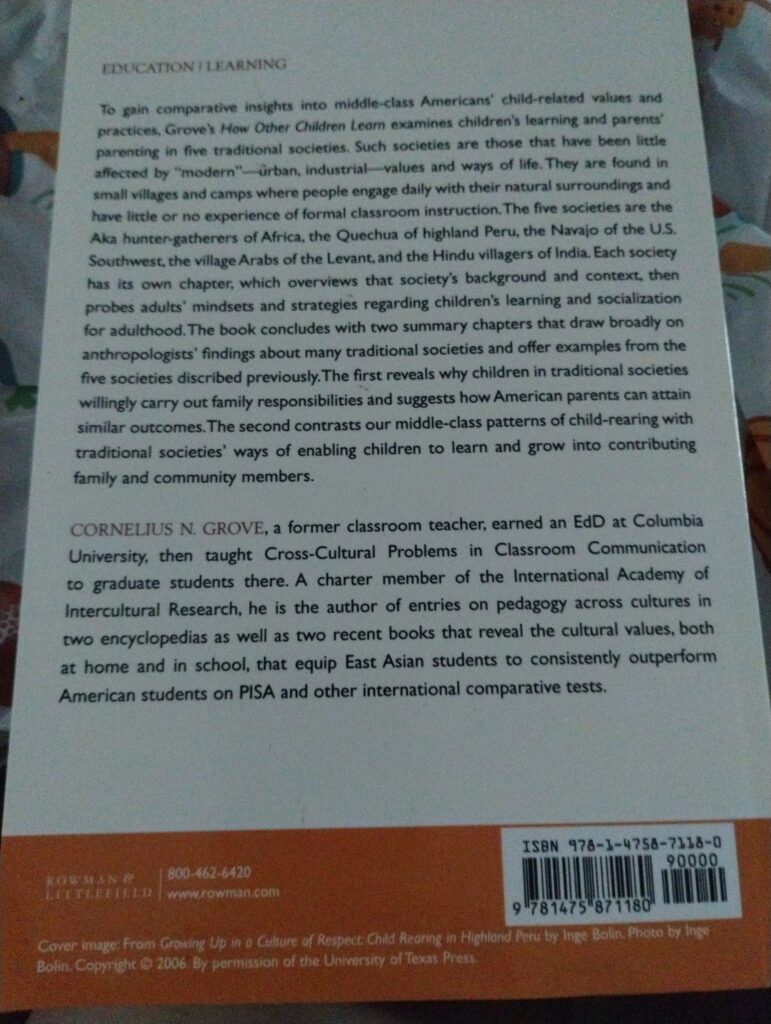Inside this post are my affiliate links if you click on the links and make a purchase I will make a small percentage from the items you purchase.
I received a copy of How Other Children Learn: What Five Traditional Societies Tell Us about Parenting and Children’s by Cornelius N. Grove in exchange for this review. If you click on the links inside the post they are my affiliate links and I will make a small percentage from the items you purchase.

How Other Children Learn examines children’s learning and parents’ parenting in five traditional societies. Such societies are those have not been affected by “modern” – urban, industrial – values and ways of life. The children have had little or no experience of formal classroom instruction. Like any child including Charlie whose been homeschooled.
The five societies are the Aka hunter-gatherers of Africa, the Quechua of highland Peru, the Navajo of the U.S. Southwest, the village Arabs of the Levant, and the Hindu villagers of India. Which has allowed Charlie and I to expand our studies this year as we can study the States in our States studies and research there ways of learning. Would you like to join us as we research this information?

To gain comparative insights into middle-class Americans’ child-related values and practices, Grove’s How Other Children Learn examines children’s learning and parents’ parenting in five traditional societies. Such societies are those have not been affected by “modern” – urban, industrial – values and ways of life. They are found in small villages and camps where people engage daily with their natural surroundings and have little or no experience of formal classroom instruction.
The five societies are the Aka hunter-gatherers of Africa, the Quechua of highland Peru, the Navajo of the U.S. Southwest, the village Arabs of the Levant, and the Hindu villagers of India. Each society has its own chapter, which overviews that society’s background and context, then probes adults’ mindsets and strategies regarding children’s learning and socialization for adulthood.
The book concludes with two summary chapters that draw broadly on anthropologists’ findings about many traditional societies and offer examples from the five societies discussed earlier. The first reveals why children in traditional societies willingly carry out family responsibilities and suggests how American parents can attain similar outcomes. The second contrasts our middle-class patterns of child-rearing with traditional societies’ ways of enabling children to learn and grow into contributing family and community members.
About the Author
Unexpected Insights for Modern Parents: Children Can Be Far More Helpful and Capable than We Allow Them to Be
Brooklyn, NY, May 18, 2023 — Cornelius N. Grove, an authority on children’s learning across cultures, recently studied child-raising practices in five traditional (pre-modern) societies. What he learned transformed his ideas about both children and parenting.
“What astonished me about parents in traditional societies is how uninvolved they are with their children,” he said, adding, “The paraphernalia, experiences and anxious 24/7/365 commitment we Americans routinely associate with parenting are absent.”
Dr. Grove defines traditional societies as those unaffected by industrialization and urbanization and untouched by modern values. They are found in small villages and camps where people engage constantly with their natural surroundings (raising, hunting or gathering their daily food) and have little or no experience of classroom instruction.
“In traditional societies, children very largely learn on their own how to become family- and community-minded adults,” Dr. Grove said. “Young children, even as young as age 3, are far more able and ready to contribute than we Americans allow them to be.”
In his eye-opening new book, How Other Children Learn: What Five Traditional Societies Tell Us about Parenting and Children’s Learning, Dr. Grove examines how children who spend little or no time in classrooms learn, and how their parents parent.
Anchored in the published research of anthropologists of childhood, How Other Children Learn takes a close look at the following five societies: the Aka hunter-gatherers of Africa, the Quechua of highland Peru, the Navajo of the U.S. Southwest, the village Arabs of the Levant and the Hindu villagers of India. Each society has its own chapter, which overviews that society’s background and context, then probes adults’ mindsets and strategies regarding childhood learning and socialization for adulthood.
The book concludes with two summary chapters that draw broadly on anthropologists’ findings about dozens of traditional societies and offer examples from the five societies featured in the book. The first summary chapter reveals how children in traditional societies learn to willingly carry out family responsibilities and suggests how American parents can attain similar outcomes. The second contrasts our middle-class patterns of child-rearing and school-attending with traditional societies’ ways of ensuring that their youngsters have opportunities to learn and develop into mature, responsible adults.
“Like their traditional peers, our children have a natural capacity to learn on their own and with other children by freely exploring, imitating adults and engaging in all sorts of activities serendipitously occurring in their community,” Dr. Grove added. “How do our children’s opportunities to freely explore and engage with others compare with those of traditional children? With school, extracurriculars and screen time, ours have very few.”
How Other Children Learn: What Five Traditional Societies Tell Us about Parenting and Children’s Learning
Publisher: Rowman & Littlefield Publishing Group
Release Date: March 1, 2023
ISBN-10: 147587118X
ISBN-13: 978-1475871180
Available from Amazon.com and BN.com
Thank you,
Glenda, Charlie and David Cates